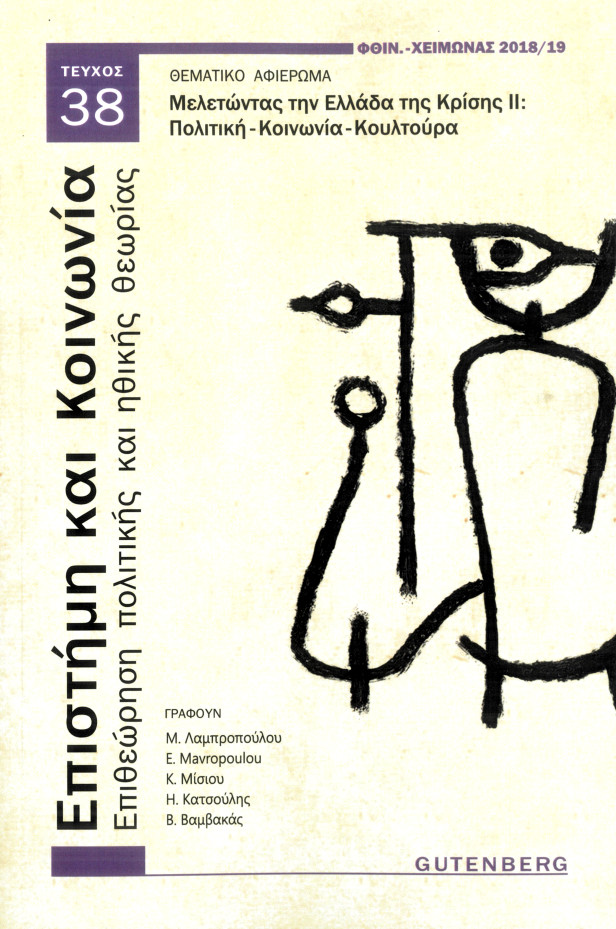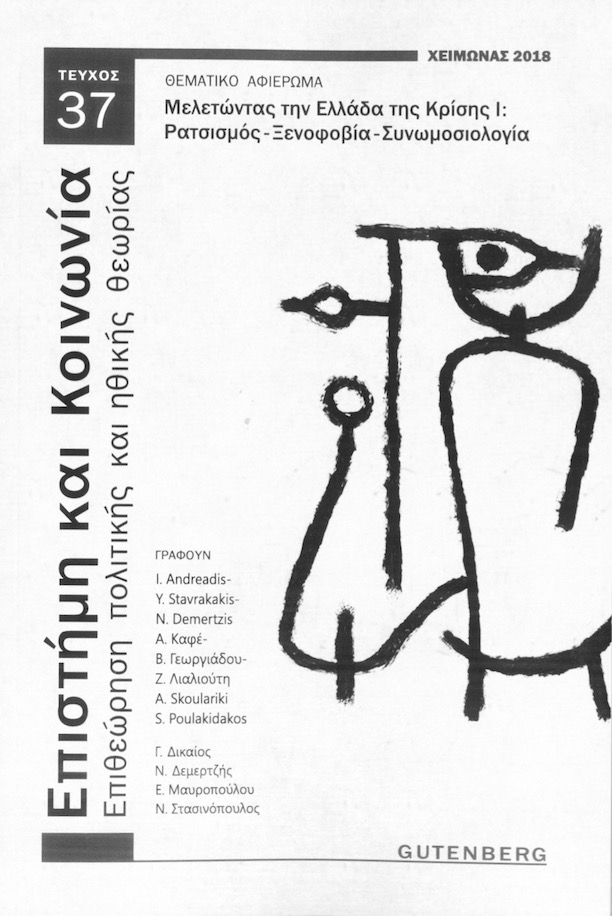Voting for far-right parties in the 2014 European Parliament Elections
Περίληψη
The primary goal of the present research note is to concentrate on the electoral performance of far-right parties in the 2014 European Parliamentary elections in order to interpret the aspects of this vote through the bidirectional relationship between the demand and supply-side theory. According to the demand-side perspective, we discuss to what extent a range of socioeconomic issues affected the electoral dynamic of the far-right parties in the latest European elections. Simultaneously, our research purpose concentrates on the external supply-side developments referring to how the positions of mainstream parties across several ideological aspects and the subsequent configuration of party competition create electoral opportunities for the far-right parties. More specifically, by comparing the views of the electorally major centre-right, centre-left and far right parties across the dimensions of immigration and redistribution of the wealth, we ascertain how the configuration of party competition influences the electoral decision of voters towards the right-wing family. Therefore, the analysis provides comparative results according to which we deduce inferences regarding the overall presence of the far-right spectrum along the party systems of every single EU member-state.
Λεπτομέρειες άρθρου
- Πώς να δημιουργήσετε Αναφορές
-
Μαυροπούλου Ε. (2019). Voting for far-right parties in the 2014 European Parliament Elections. Επιστήμη και Κοινωνία: Επιθεώρηση Πολιτικής και Ηθικής Θεωρίας, 38, 50–77. https://doi.org/10.12681/sas.17744
- Ενότητα
- Άρθρα

Αυτή η εργασία είναι αδειοδοτημένη υπό το CC Αναφορά Δημιουργού – Μη Εμπορική Χρήση – Παρόμοια Διανομή 4.0.
Οι Συγγραφείς που δημοσιεύουν εργασίες τους σε αυτό το περιοδικό συμφωνούν στους παρακάτω όρους:- Οι Συγγραφείς διατηρούν τα Πνευματικά Δικαιώματα και χορηγούν στο περιοδικό το δικαίωμα της πρώτης δημοσίευσης ενώ ταυτόχρονα τα πνευματικά δικαιώματα της εργασίας προστατεύονται σύμφωνα με την άδεια Creative Commons Αναφορά Δημιουργού - Μη Εμπορική Χρήση - Παρόμοια Διανομή 4.0 Διεθνές , που επιτρέπει σε τρίτους - αποδέκτες της άδειας να χρησιμοποιούν την εργασία όχι για εμπορικούς σκοπούς, με την προϋπόθεση της διατήρησης των διατυπώσεων που προβλέπονται στην άδεια σχετικά με την αναφορά στον αρχικό δημιουργό και την αρχική δημοσίευση σε αυτό το περιοδικό και με διανομή τυχόν τροποποιήσεων υπό την ίδια άδεια όπως και το πρωτότυπο.
- Οι Συγγραφείς μπορούν να συνάπτουν ξεχωριστές, και πρόσθετες συμβάσεις και συμφωνίες για την μη αποκλειστική διανομή της εργασίας όπως δημοσιεύτηκε στο περιοδικό αυτό (π.χ. κατάθεση σε ένα ακαδημαϊκό καταθετήριο ή δημοσίευση σε ένα βιβλίο), με την προϋπόθεση της αναγνώρισης και την αναφοράς της πρώτης δημοσίευσης σε αυτό το περιοδικό.
- Το περιοδικό επιτρέπει και ενθαρρύνει τους Συγγραφείς να καταθέτουν τις εργασίες τους μέσω διαδικτύου (π.χ. σε ένα ακαδημαϊκό καταθετήριο ή στους προσωπικές τους ιστοσελίδες) πριν και μετά από τις διαδικασίες της δημοσίευσης, καθώς αυτό μπορεί να οδηγήσει σε παραγωγική ανταλλαγή ιδεών και σκέψεων καθώς επίσης και σε γρηγορότερη και μεγαλύτερη χρήση και ευρετηρίαση της δημοσιευμένης εργασίας (See The Effect of Open Access).




